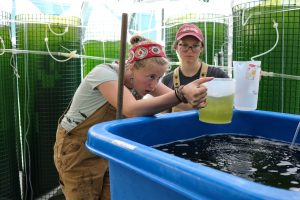2022 Symposium
View the 2022 SEA Fellows’ Posters
Download the 2022 SEA Fellows’ Poster Abstracts
Impacts of climate change, coupled with social and economic disruption created by the pandemic, have highlighted the importance of students concurrently gaining technical knowledge and experience and experience in collaboration, knowledge co-production and leadership. The 2022 Sea Fellows Program has been designed with these student and societal needs in mind. Through a series of virtual round tables, held biweekly on Wednesdays at noon (June 1-August 3), SEA (Science for Economic Impact and Application) Fellows are learning more about climate-relevant science and action; meeting other undergraduate students statewide who share their interests in solutions-oriented research and public engagement; and honing their skills in communication and collaboration. The program culminated in the public symposium on August 9th at the Downeast Institute, where students shared their summer research.
* All students conducting research in Maine are encouraged to participate. The program for participating students runs 9 to 3:30 pm, whereas the public symposium runs from 1 to 3 pm.
| Poster | Presenter | Poster Title |
| 1 | Atticus Scott | Optimizing a cost-effective eRNA extraction method using zebrafish RNA |
| 2 | Austin Simmons | Using mapping tools to support community decision making |
| 3 | Bodin Kim-Dailey | How lobster injuries can cause death and how to limit them |
| 4 | Brendan Mirra | Understanding community attitudes toward ocean renewable energy |
| 5 | Caitlin Haley | Detecting Calanus finmarchicus in larval American lobster guts using eDNA |
| 6 | David Carter | Using light backscattering to estimate particle size relevant to carbon uptake |
| 7 | Eliza Grenci | Effects of ploidy on oyster growth in the Damariscotta River |
| 8 | Elizabeth Gilpatrick | Effects of intertidal gear on oyster shell shape and meat quality |
| 9 | Emily Leonard | Scaling up shifts in lobster habitat use in midcoast Maine |
| 10 | Emily Wagg | What is the Maine Coastal Current and where does it go? |
| 11 | Etain Cullen | Identifying Thraustochytrids and their role in marine ecosystems |
| 12 | Evan Busch | Horseshoe crab aquaculture in Downeast Maine |
| 13 | Jakob O’Neal | Using remote sensing to assess wild oyster populations |
| 14 | Lena Kury | Testing underwater video to identify juvenile Atlantic cod (Gadus morhua) |
| 15 | Lindsey Karwacki | Reproduction and culture of moon jelllyfish in Downeast Maine |
| 16 | Luke Goldman | Detecting Atlantic cod spawning with eDNA |
| 17 | Natalie Tejeda | How fast do oysters grow in intertidal systems compared to floating cages? |
| 18 | Owen Hamel | Do lobsters move randomly to escape low oxygen environments? |
| 19 | Phoebe Wagner | Overwintering of late season upweller oyster seed via cold storage to increase supply of early-season seed |
| 20 | Rachael Smith | Climate change effects on an invasive tunicate’s attachment ability |
| 21 | Rose Duane | Circadian rhythm cycles and its effect on genetic code of sea scallops (Placopecten magellanicus) |
| 22 | Ruby Krasnow | Effects of gear type and environment on oysters grown in a lobster impoundment |
| 23 | Sophia Pelletier | Changing sea star populations in the Gulf of Maine |
| 24 | Brady Kaelin | Can mushroom spores germinate after spending time in seawater? |
| 25 | James Custer | How does temperature affect the movement of invasive crabs in Maine? |
| 26 | Samantha Bengs | Influences of scallop farming gear on pelagic ecosystems |
| * | Meghan Nadzam | Check out MN’s article after the sympoisum: Diving into student research at the SEA Fellows Summer Science Symposium |
Partners & Support
The SEA Fellows Program is supported by UMaine’s Darling Marine Center and the Downeast Institute, which serves as the University of Maine at Machias’ marine field station. Additional support of the program in the last six years has come from US National Science Foundation awards to Maine EPSCoR at UMaine, the UMS Research Reinvestment Fund, Henry David Thoreau Foundation, and grants led by individual collaborating faculty and external mentors.
To learn how you can be involved as a student or as an industry or academic mentor, please contact Heather Leslie or Brian Beal.

